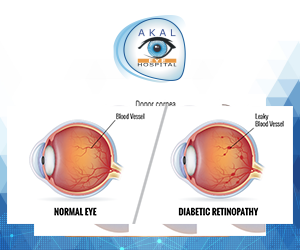


Diabetic eye disease is the most common form of diabetic eye disease. Diabetic eye disease usually only affects people who have had diabetes for a significant number of years. Diabetic Eye disease can affect all diabetics and becomes particularly dangerous, increasing the risk of blindness, if it is left untreated.
The risk of developing diabetic eye disease is known to increase with age as well with less controlled blood sugar and blood pressure level. The other name of Diabetic eye disease is Diabetic retinopathy
• blurred vision
• the impairment of color vision
• transparent and colorless or blur spots and dark strings that float in the patient's field of vision
• patches and streaks that block the person's vision
• poor night vision
• sudden and total loss of vision
The Medical treatment of diabetic eye disease is normally directed at the underlying problem, diabetes itself. The better control a patient has of the disease, the lesser problems they will have in the long run. For diabetic retinopathy, various medical treatment available includes injections of corticosteroids or anti-vascular-proliferative medications in the area around the eye may be used. The presence of glaucoma requires the use of antiglaucoma medications in the form of eye drops.
Laser Treatment - Lasers are widely used nowadays in treating diabetic retinopathy and is performed as an out-patient procedure. In this treatment, an intense and highly energetic beam of light is focused on the area to be treated with the aid of the slit lamp and a special contact lens. This will reduce retinal thickening and stops bleeding. Further treatment may be required depending on the patient’s condition.
Surgical Treatment – In some of the patients, the vitreous may pull on the retina reducing vision severely. In such cases, a surgical procedure is known as vitrectomy is performed. This surgery is done for new advanced stage of Diabetic Retinopathy.
• Make a commitment to managing your diabetes.
• Monitor your blood sugar level
• Ask your doctor about a glycosylated hemoglobin test.
• Keep your blood pressure/sugar and cholesterol under control.
• If you smoke or use any other types of tobacco, ask your doctor to help you quit.
• Pay attention to vision changes.
Cases that present early and are adequately lasered generally maintain good eye vision. A good control of diabetes is most important to slow the progression of the disease. A combination of injectable drugs and laser has improved the outcome in moderately advanced cases also. The outcome may not be very good in advanced cases even after surgery, however some useful vision can be retained.
Dr. Sunil Mehra offer round the clock support for handling all aspects of travel and medical treatment in India. Covering a wide range of therapeutic treatments. Treating the patients with a humane feel.
